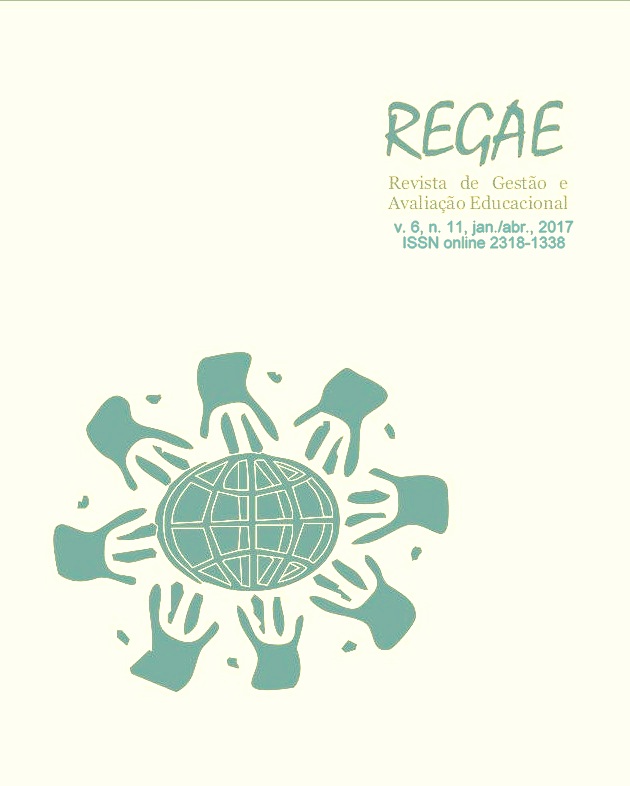Articulation Program More Education with political and educational project: contributions in formation of pupils
DOI:
https://doi.org/10.5902/2318133824560Abstract
This text is an excerpt of the monograph held at Specialization in Educational Management which is related to the More Education Program and political-pedagogical project. In the theoretical framework, we start from the pioneering idea of Integral Education in designing Teixeira, beyond the fundamentals of Lück (2000, 2006), Veiga (2004) and Gadotti (2000). This study aimed to analyze and identify how the union between these two points can interfere qualitatively in the training of students. In the results it is considered that even not finding a link between the SMEs and the school of the PPP, the program has acceptance in the school community, fulfilling the role that it proposes: to assist children in vulnerability and monitoring of school learning situation.
Key-words: More education program, political-pedagogical project, integral education.
Downloads
References
ALMEIDA JÚNIOR, João Batista de. O estudo como forma de pesquisa. In: CARVALHO, Maria Cecília M. de (org.). Metodologia científica fundamentos e técnicas: construindo o saber. Campinas: Papirus, 1989, p. 97-118.
BRASIL. Lei n. 9.394, de 20 de dezembro de 1996. Lei de Diretrizes e Bases da
Educação Nacional. Brasília, 1996. Disponível em . Acesso em 18
set. 2015.
BRASIL. Portaria Normativa Interministerial n. 17. Aprovada em 24 de Abril de 2007. Institui o Programa Mais Educação. Disponível em <http://portal.mec.gov.br/arquivos/pdf/mais_educacao.pdf>. Acesso em 15 ago. 2015.
BRASIL. Decreto n.. 7.083. Aprovado em 27 de janeiro de 2010. Dispõe sobre o Programa Mais Educação. Disponível em <http://www.planalto.gov.br/ccivil_03/_ato2007-2010/2010/decreto/d7083.htm>. Acesso em: 15 Ago. 2015.
BRASIL. Programa Mais Educação: Passo a passo (2009). Ministério da Educação. Disponível em <http://portal.mec.gov.br/dmdocuments/passoapasso_maiseducacao.pdf>. Acesso em 20 ago. 2015.
BRASIL. Plano Nacional de Educação 2014-2024. Lei n. 13.005, de 25 de junho de 2014, que aprova o Plano Nacional de Educação (PNE) e dá outras providências. Brasília: Câmara dos Deputados, 2014.
ÉBOLI, Therezinha. Uma experiência de educação integral. Rio de Janeiro: Fundação Getulio Vargas/Instituto Nacional do Livro, 1971.
GADOTTI, Moacir. Perspectivas atuais da educação. Porto Alegre: Artes Médicas, 2000.
GHIRALDELLI, Paulo Jr. Filosofia e história da educação brasileira. São Paulo: Manoele, 2003.
GODOY, Arilda S. Introdução à pesquisa qualitativa e suas possibilidades. Revista de Administração de Empresas (RAE), v. 34, n. 2, 1995a, p. 57-63.
GUARÁ, Isa. É imprescindível educar inteligentemente. Cadernos CENCEP, n. 2, 2006, p. 15-24, Disponível em <http://cadernos.cenpec.org.br/cadernos/index.php/cadernos/article/view/168>. Acesso em 19 set. 2015.
HENGEMUHLE, Adelar. Gestão do ensino práticas pedagógicas. Petrópolis: Vozes, 2007.
LÜCK, Heloísa. Concepções e processos democráticos de gestão educacional. Petrópolis: Vozes, 2006.
LÜCK, Heloísa. Perspectivas da gestão escolar e Implicações quanto à formação de seus gestores. In: Gestão escolar e formação de gestores. Em Aberto. Brasília, v. 17, n. 72, 2000, p. 1-195.
LÜDKE, Menga; ANDRÉ, Marli Elisa Dalmazo Afonso de. Pesquisa em educação: abordagens qualitativas. São Paulo: Pedagógica e Universitária, 1986.
MOLL, Jaqueline et al. Caminhos da educação integral no Brasil: direito a outros tempos e espaços educativos. Porto Alegre: Penso, 2012.
MOLL, Jaqueline. 5 soluções para o ensino integral. Revista Nova Escola, ano IV, n. 21, 2012, p. 22-29.
NUNES, Clarice. Anísio Teixeira. Recife. Massangana, 2010.
TEIXEIRA, Anísio Espínola. Centro Educacional Carneiro Ribeiro. Revista Brasileira de Estudos Pedagógicos. Rio de Janeiro, v. 31, n. 73, 1959, p. 78-84.
VEIGA, Ilma Passos Alencastro. Projeto político-pedagógico da escola: uma construção possível. Campinas: Papirus, 2004.
Downloads
Published
How to Cite
Issue
Section
License
Authors keep copyright and concede to the magazine the right of first publication, with the work simultaneously licensed under the Creative Commons Attribution 4.0 International, non-commercial license with no derivative work, which allows to share the work with no author recognition and initial publication in this magazine.
Authors has authorization to overtake additional contracts separately, to distribute a non-exclusive version of the work published in this magazine: For example: to publish in an institutional repository or as a chapter of a book, with authorial recognition and initial publication in this magazine.
Authors are allowed and are encouraged to publish and distribute their work online. For example: in institutional repositories or in their own personal page – at any point before or during the editorial process, because this can result in productive changes, as well as increase the impact and the mention to the published work.






